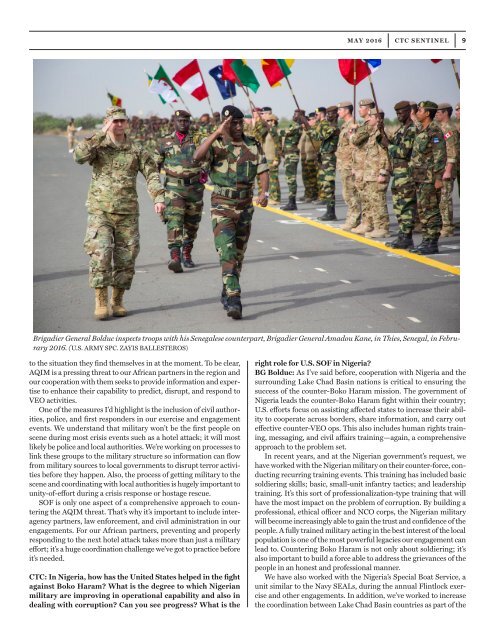The Challenges of Explosive Detection
CTC-SENTINEL_Vol9Iss58
CTC-SENTINEL_Vol9Iss58
You also want an ePaper? Increase the reach of your titles
YUMPU automatically turns print PDFs into web optimized ePapers that Google loves.
MAY 2016 CTC SENTINEL 9<br />
Brigadier General Bolduc inspects troops with his Senegalese counterpart, Brigadier General Amadou Kane, in Thies, Senegal, in Februrary<br />
2016. (U.S. ARMY SPC. ZAYIS BALLESTEROS)<br />
to the situation they find themselves in at the moment. To be clear,<br />
AQIM is a pressing threat to our African partners in the region and<br />
our cooperation with them seeks to provide information and expertise<br />
to enhance their capability to predict, disrupt, and respond to<br />
VEO activities.<br />
One <strong>of</strong> the measures I’d highlight is the inclusion <strong>of</strong> civil authorities,<br />
police, and first responders in our exercise and engagement<br />
events. We understand that military won’t be the first people on<br />
scene during most crisis events such as a hotel attack; it will most<br />
likely be police and local authorities. We’re working on processes to<br />
link these groups to the military structure so information can flow<br />
from military sources to local governments to disrupt terror activities<br />
before they happen. Also, the process <strong>of</strong> getting military to the<br />
scene and coordinating with local authorities is hugely important to<br />
unity-<strong>of</strong>-effort during a crisis response or hostage rescue.<br />
SOF is only one aspect <strong>of</strong> a comprehensive approach to countering<br />
the AQIM threat. That’s why it’s important to include interagency<br />
partners, law enforcement, and civil administration in our<br />
engagements. For our African partners, preventing and properly<br />
responding to the next hotel attack takes more than just a military<br />
effort; it’s a huge coordination challenge we’ve got to practice before<br />
it’s needed.<br />
CTC: In Nigeria, how has the United States helped in the fight<br />
against Boko Haram? What is the degree to which Nigerian<br />
military are improving in operational capability and also in<br />
dealing with corruption? Can you see progress? What is the<br />
right role for U.S. SOF in Nigeria?<br />
BG Bolduc: As I’ve said before, cooperation with Nigeria and the<br />
surrounding Lake Chad Basin nations is critical to ensuring the<br />
success <strong>of</strong> the counter-Boko Haram mission. <strong>The</strong> government <strong>of</strong><br />
Nigeria leads the counter-Boko Haram fight within their country;<br />
U.S. efforts focus on assisting affected states to increase their ability<br />
to cooperate across borders, share information, and carry out<br />
effective counter-VEO ops. This also includes human rights training,<br />
messaging, and civil affairs training—again, a comprehensive<br />
approach to the problem set.<br />
In recent years, and at the Nigerian government’s request, we<br />
have worked with the Nigerian military on their counter-force, conducting<br />
recurring training events. This training has included basic<br />
soldiering skills; basic, small-unit infantry tactics; and leadership<br />
training. It’s this sort <strong>of</strong> pr<strong>of</strong>essionalization-type training that will<br />
have the most impact on the problem <strong>of</strong> corruption. By building a<br />
pr<strong>of</strong>essional, ethical <strong>of</strong>ficer and NCO corps, the Nigerian military<br />
will become increasingly able to gain the trust and confidence <strong>of</strong> the<br />
people. A fully trained military acting in the best interest <strong>of</strong> the local<br />
population is one <strong>of</strong> the most powerful legacies our engagement can<br />
lead to. Countering Boko Haram is not only about soldiering; it’s<br />
also important to build a force able to address the grievances <strong>of</strong> the<br />
people in an honest and pr<strong>of</strong>essional manner.<br />
We have also worked with the Nigeria’s Special Boat Service, a<br />
unit similar to the Navy SEALs, during the annual Flintlock exercise<br />
and other engagements. In addition, we’ve worked to increase<br />
the coordination between Lake Chad Basin countries as part <strong>of</strong> the


